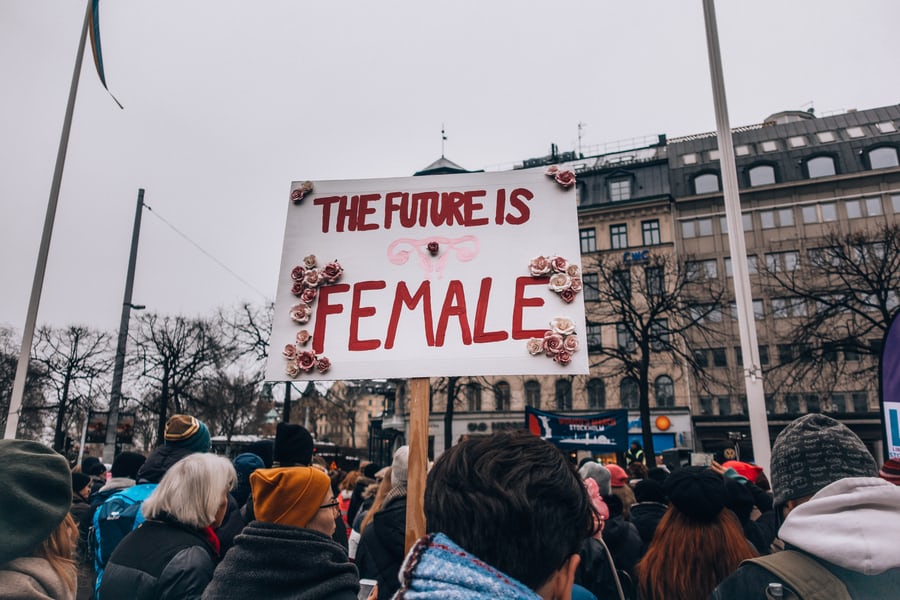The Toxicity of TikTok: Regressive or Progessive Feminism?

TikTok has grown to be one of the most influential social media apps in the world, with over 1 billion users. Social media has always sparked controversy surrounding its negative effects on mental health, and TikTok does not fall short in this respect. The algorithm of TikTok is a recommendation system, based on the content a user views and likes the most, personalizing a user's feed for their specific preferences and establishing the perfect statistics on the factors leading to viral content.
TikTok is a platform that provides content for everyone, from cooking and comedy, to business and much more. Some of the more popular categories within the platform are lifestyle, beauty and dancing videos with viral trends that can garner millions of viewers. While many of these trends are harmless, some of them have been designed to simply showcase women’s bodies. The argument surrounding these controversial trends is whether they are liberating and empowering, or objectifying and demeaning.
Sitting down with AUP student Sofie Sedgwick, a TikTok user and creator with over 120,000 followers and more than 7.3 million likes on her published content, her experience as a monetized creator on the app has not always been empowering and positive as her content may suggest.
“I create lifestyle content, but I have always felt pressured to create more revealing content as those videos do the best. In a video where I am showing more of my body, and look skinnier, I will get more views and likes”, Sedgwick says, “I do think it can be empowering, but it hasn’t always been good for my mental health. I often feel insecure comparing myself to other creators and seeing girls who perpetuate unrealistic body standards do better than me. I’ve actually had to delete the app before just for a break.”
Image credit: Unsplash/Lindsey LamontThe first wave of feminism, beginning at the end of the 19th century, centered in on women's voting rights. The second wave came in the 1960s, paralleling many other civil rights movements and broaden the subject to challenge the patriarchy and push gender equality. The third wave had the least distinct timeline, yet opened the dialogue to diversity and the beginnings of sex positivity.
Fourth wave feminism has explored the methods to empower women using digital tools to navigate gender norms in the context of society and politics. One of the methods of destabilizing certain patriarchal gender norms has focused on sex positivity and allowing women to take ownership of the sexualization of their bodies. This ownership has prompted pop culture to normalize content that many would consider lewd, offensive and even falling under the category of soft pornography.
Although the third wave never truly had an official “end,” activists recognize that the 21st century has ushered in a new type of #activism. Explore more in our new virtual exhibit, "Feminism: The Fourth Wave". https://t.co/0IG3HEkmTY #WomensHistory #Feminism
— National Women's History Museum (@womenshistory) December 6, 2021
TikTok has consistently been utilized as a tool for sex positivity and body positivity, falling under the umbrella of postmodern feminism. Although well intentioned, many claim that certain TikTok trends have been damaging to feminism as the trends are centered exclusively around objectification and vanity. In addition, the algorithm of TikTok has pressured many female creators to create more suggestive and at times, overtly sexual content as it will increase their engagement and chances of going viral, garnering more views and followers.
Further, many TikTok users have claimed that given the saturation level of female content creators, the criteria to go viral has bred an unhealthy competition amongst female creators, a complete contradiction to modern feminism.
Given the demographic of TikTok users being 60% women, with 32.5% of users being between the ages of 10 and 19, 60% between the ages 16-24, there are plenty of impressionable minors who view salacious content and become desensitized to the sexualization of women.
This begs the question, in a postmodern feminist society, is TikTok propelling the feminist movement into a progressive or regressive state?
The idea of revealing content or trends that center around showcasing female bodies as demeaning is subjective to both the user and creator, yet the basis on which the content will go viral on is revealing of the toxic masculinity that is ingrained in the means for capitalizing on social media. The idea that female ownership over the sexualization of female bodies is a derivative of feminism, is a sham that was curated by social media algorithm, as the real ownership still lies with the male gaze, being synonymous with means for monetization.
As Sedgwick commented, unrealistic body standards are still being heavily perpetuated on the app. Although there may be a large community on the app that posts content in support of body positivity, the statistics reveal that women that fit the postmodern beauty standard will receive the most views and likes and subsequently validating these standards.
Image credit: Unsplash/FreeStocksLauren Rosker, another AUP student and lifestyle TikTok creator with a staggering 55,000 user following has a few differing views, describing the platform as a free space for female creators to indulge in creating content that once would have been deemed highly offensive and taboo. "I personally do not show off my body online, it's not for me, but I think the women that do feel liberated and are progressing the feminist movement to a better place."
When asking Rosker whether she has ever felt pressured to post sexualizing content, she said yes. "I know that if I show more of my body, my video will do better, but I don't give into the pressure. I only post what I'm comfortable with, but I still feel the pressure a lot of the time."
Rosker may have the awareness to resist the social pressures to cross her boundaries and sexualize herself online, but this does not erase the fact that this is happening and is accessible to young and impressionable women. Younger generations of girls will continue to use apps like TikTok and become exposed to the radical feminism that continues to endorse the antithesis of their movement through the label of "liberation".
Postmodern feminism has pushed trends and ideals that are actually enabling the patriarchal misogyny that they are trying so hard to dismantle.









